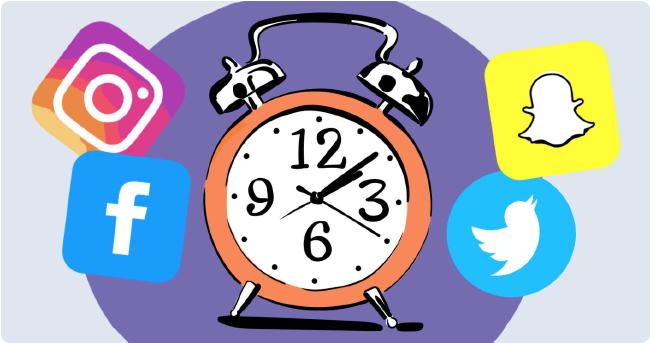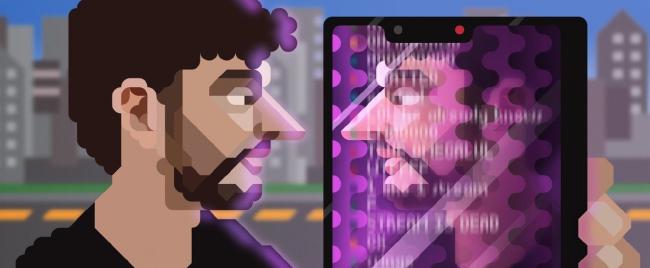Categories
Life in likes: Choose to be yourself
7 minute read
Hands up if you’ve ever felt like you’re spending too much time on your phone? It’s a familiar feeling to many of us, particularly those in the tricky 18 to 24 age bracket. According to Ofcom, they spend on average 3 hours and 14 minutes on their phones each day. Many in this age group admit to using their phones compulsively and feeling anxious and low after spending time online. But, there’s a positive side to social media, too. It can help people develop their personal identity through online communities and gives people access to an instant resource for learning and self-expression.
Cue Bea Herbert, trained in psychology and psychotherapy, is a mental health expert. She’s here to talk to us about the challenges of social media and how to find balance in it all. Bea spearheads “States of Mind”, an organisation that helps manage and prevent mental health problems in young people. She breaks down her fantastic insights to help us all take control of our digital well-being.
Over to Bea:
As with anything that appears on first impression as a quick fix to life’s challenges, social media use has created some issues that were initially hard to predict. Social media can cause:
- Important relationships to fragment instead of growing
- A sense of isolation rather than belonging
- Insecurity instead of self-assurance
A new form of social media use

As many struggle with conflicting feelings towards their time on social media, we must engage in a new form of digital self-care to create a healthy balance and maintain our well-being in the internet age. The main points to achieve it are:
- Taking back control of your digital life
- Choosing to be yourself
- Balancing time spent online and offline
- Giving your mind a break to process your experiences
- Focusing your attention on one task at a time
- Developing mental clarity
- Distinguishing what’s real and what’s not real on social media
- Avoiding the creation of unrealistic expectations about yourself
Taking back control
To take back control and achieve a sense of inner clarity and calm, our mind needs time to rest and process our experiences. We cannot do this when we are preoccupied with all the info we consume on social media. It works by dividing and splitting our attention into “micro moments” in which we consume large amounts of info but are left feeling unfulfilled and wanting more.
To feel a sense of accomplishment and ease, we must focus our attention on one task for sustained periods of time.
Focused attention is crucial for maintaining our mental and emotional health as it allows us to engage in a process of self-reflection towards our goals and inner experiences. It helps us to make more confident decisions about what we most want from our lives and how we want to achieve it. It will also help us to switch to a healthier mindset of noticing what we already have and are grateful for instead of an unhealthy preoccupation with what we lack.
Ensure that you are taking time each day to maintain mindful attention on the world outside your phone screen. This could be a phone-free commute, reading a book, meeting a friend and not checking your phone, or spending time at the beginning and end of each day reflecting on your experiences.
Choosing yourself

If social media seems to be dominating your waking life, create simple new routines that help establish a greater focus on your true needs.
The morning and evening are the most important times for making space to check in with ourselves and to develop mental clarity.
Make sure to spend at least an hour technology-free before sleeping. You will allow your mind to rest which will decrease anxiety and stress. You will give yourself time to process the day and step back from “doing” mode and help to reduce the cognitive overload caused by ‘consuming’ online info.
When you wake up, take 10 minutes to pause and do something for yourself that will boost your mood. Try stretching to reduce tension and make this a mindful practice where you tune into your body to start your day feeling grounded and at ease.
Listen to an energising song instead of scrolling through social media, make sure you are clear on what you need to do and how you want to do it before becoming distracted with the online world.
Dedicate 10 minutes to organising your plans for the day. As part of this planning, make a note to yourself of how long you would like to spend on social media and start developing discipline in your routine.
Just 10 minutes of externalising your thoughts will provide clarity and reduce feelings of stress and anxiety.
Instagram vs reality

Instagram is a highlight reel of life’s most beautiful moments. It is a platform that promotes the aesthetic. But there is always more to an image than meets the eye. For every “perfect” photo there are many more that were not overlooked because of their “flaws”. When we compare ourselves to others and experience envy, we are negatively impacting our mental health by creating unrealistic expectations about ourselves. Celebrate what makes your life different and develop the parts of yourself you value instead of focusing on what you lack.
One of the main reasons for social anxiety is falling under the illusion that we can control what other people think of us.
Top tips for digital self-awareness
Social media works by giving us a quick burst of validation and leaves us craving more. As with any relationship, we shouldn’t depend on somebody else to validate our self-worth. It will never be able to provide us with the validation we need to provide for ourselves.
Be honest about what you are finding difficult and what you need help with. Social media can create huge pressures to appear as if we are immune to life’s difficulties but emotional honesty is the greatest gift we can give ourselves and each other.
The key to healthy self-esteem is thinking about our values and goals, both in the long- and short-term. How we invest our time in the today is crucial for our long-term fulfilment. Take time to think about what would boost your confidence over the course of the next year and spend time planning when you will make time for yourself to do new things or work on existing goals.
Online vs offline

Social media may help us to express things we find hard to in real life, but if it’s the only means of communicating our difficulties we will soon feel isolated and withdraw from reality.
When we provide mindful moments of attention to our thoughts and behaviour, we’re taking responsibility for how we live our lives. Social media can often be used as an escape and become an unhelpful coping mechanism that causes us to avoid our challenges offline. The more we use social media to avoid our difficulties in the real world, the more they will manifest in strong, unprocessed emotions that cloud our perception in everyday life.
Nobody knows what we are struggling with unless we tell them. We have an ancient need to be cared for and understood and while social media provides a temporary sense of relief, there is no replacement for an honest, in-person conversation with others. We need dedicated space and time to be truly listened to and heard. The fast-paced nature of social media can often leave us feeling as if this need is perpetually unmet.
Choose to be yourself
Organise a day out with friends and go technology-free. Notice how different your experience is compared to communicating online. You will probably be surprised at how relieved everybody is to put down their phone for a few hours.
Just noticing these differences is a healthy step forward in developing greater self-awareness towards our technology use.
Making changes in our relationship with technology can be hugely empowering and life-changing if we commit to maintaining a healthy level of self-awareness towards it.
Changing old patterns can seem intimidating, and change doesn’t happen overnight. But, these simple techniques can help you kick-start a new approach to using technology that helps you to feel responsible and in control.





